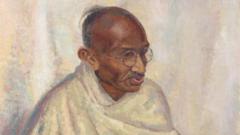Concerns arise over the implications of his music and its potential influence following a revelation connecting him to a controversial genre often criticized for glorifying violence.
**Drill Music Controversy Sparks Renewed Attention to Convicted Murderer**

**Drill Music Controversy Sparks Renewed Attention to Convicted Murderer**
A man sentenced for murder in London faces scrutiny over his drill rap persona after being conditionally released.
In a compelling case that intertwines crime and culture, Jake Fahri, a convicted murderer sentenced in 2009, has found himself back in the spotlight after a tabloid investigation posited that he was also an underground drill rapper known as TEN. Fahri had been convicted for the brutal killing of 16-year-old Jimmy Mizen in a bakery fight that resulted in a fatal injury when a glass baking dish was thrown. After serving part of his life sentence and being conditionally released in 2023, Fahri's musical pursuits have generated significant concern and discussion.
Drill music, a sub-genre of hip-hop originating in the UK, often reflects the harsh realities of street life, encompassing themes of violence, crime, and survival. Advocates of drill argue it serves as a form of expression for marginalized communities, providing a voice for those often excluded from mainstream discourse. Yet, critics have drawn troubling connections between drill lyrics and actual violence, fueling debates about responsibility and censorship in music.
The revelation that the notorious killer and the drill rapper could be one and the same has prompted heightened scrutiny of Fahri's music, with the victim's family expressing dismay. Barry and Margaret Mizen, Jimmy's parents, have voiced distress at the possibility of their son’s murderer gaining notoriety through his artistic endeavors.
Fahri, who claimed self-defense during his trial, had his life irrevocably altered by the tragic incident. His emergence in the music scene has alarmed community members and officials who fear that glorifying violent narratives could inspire similar actions among impressionable youth. With communities grappling to understand the complex relationships between crime, media representation, and art, Fahri's case may serve as a pivotal point in ongoing discussions surrounding the impact of musical genres like drill on society. As investigations continue, this intersection of music, crime, and social responsibility remains a crucial focal point in the struggle against urban violence.
Drill music, a sub-genre of hip-hop originating in the UK, often reflects the harsh realities of street life, encompassing themes of violence, crime, and survival. Advocates of drill argue it serves as a form of expression for marginalized communities, providing a voice for those often excluded from mainstream discourse. Yet, critics have drawn troubling connections between drill lyrics and actual violence, fueling debates about responsibility and censorship in music.
The revelation that the notorious killer and the drill rapper could be one and the same has prompted heightened scrutiny of Fahri's music, with the victim's family expressing dismay. Barry and Margaret Mizen, Jimmy's parents, have voiced distress at the possibility of their son’s murderer gaining notoriety through his artistic endeavors.
Fahri, who claimed self-defense during his trial, had his life irrevocably altered by the tragic incident. His emergence in the music scene has alarmed community members and officials who fear that glorifying violent narratives could inspire similar actions among impressionable youth. With communities grappling to understand the complex relationships between crime, media representation, and art, Fahri's case may serve as a pivotal point in ongoing discussions surrounding the impact of musical genres like drill on society. As investigations continue, this intersection of music, crime, and social responsibility remains a crucial focal point in the struggle against urban violence.





















